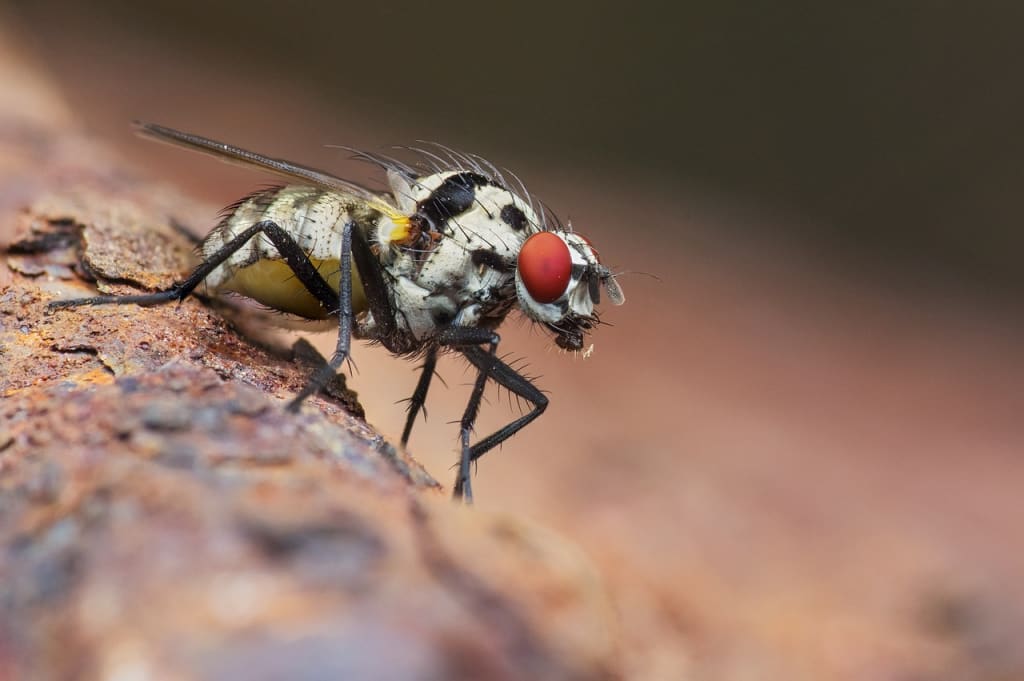Zombie Apocalypse Has Already Begun – With Flies
"Fungi Takeover: Exploring the Real Threat of Parasitic Mind Control in Nature"

We have acquired knowledge about the zombie apocalypse through various mediums such as movies, video games, and sci-fi literature. These portray slow or fast zombies roaming the deserted streets of cities, in search of fresh sustenance, while survivors come together in small communities to rebuild society. However, what if a real-life zombie apocalypse is completely different from these depictions? Picture a scenario where large cities are under quarantine, filled with crowds of people with vacant eyes. They refrain from physical contact, appear harmless, and gaze into the distance with a detached demeanor. It seems as though they have lost control of themselves and their individuality. Then, unexpectedly, they begin to climb lamp posts. People ascend to great heights, adhering to the metal surfaces with a glue-like substance secreted from their saliva, and patiently wait. After a few hours, something peculiar starts to emerge from their backs, releasing fungal spores into the air. These spores disperse throughout the city, landing on uninfected individuals and infiltrating their bodies to seize control of their brains. This is what a genuine zombie apocalypse would resemble, and in reality, it has already commenced, my fellow humans, albeit with flies.
A specific type of parasitic fungus has acquired the ability to manipulate the minds and behaviors of wild fruit flies. The fungal spores enter the insect's body, infiltrating its nervous system, and compelling it to carry out specific actions. Gradually, the infected fly relinquishes control of its own body to the parasite, which sustains itself by consuming the insect from within. Eventually, the fungus reaches the fly's brain and exerts its influence. Scientists firmly believe that the fungus secretes a peculiar substance that enables it to stimulate the fly's neurons, prompting the release of a specific hormone. This hormone triggers a surge in the fly's motor activity, rendering it significantly faster. Consequently, the insect becomes swift and loses interest in its usual source of nourishment. At dusk, it ascends any elevated surface, such as a blade of grass, and adheres itself to the substrate using a sticky substance emitted from its proboscis. The parasitic fungus generates this adhesive saliva, enabling the flies to firmly attach themselves. Once affixed, the fly becomes immobilized, raising its wings, and the peculiar spectacle unfolds.
Parasites don't make their transporters forceful wholesalers of the infection. A contaminated subterranean insect doesn't chomp its companions in an ant colony dwelling place, and a fly doesn't attempt to eat different bugs, and that implies tainted individuals would serenely climb a few slopes and delivery spores from their bodies. Not so much tomfoolery as running zombies, but rather it's as yet a startling destiny for humankind. Fortunately such parasites will not have the option to assume control over our brains, sooner rather than later. Cordyceps that assault insects might have advanced for a long period of time to acquire the capacity to control the personalities of little bugs. They have made a substance to change the sensory system of insects; just it resembles a key, and each living organic entity has an alternate keyhole. Finding the right key to the human body is significantly more troublesome. The parasite might require countless years, and perhaps more, gave it lives close to individuals this time. Luckily, such growths are not our neighbors.
One more obstruction to disease is temperature. Parasitic organisms pick bugs since they have adjusted definitively to their temperature, which varies from individuals'. In our bodies, such living beings basically can't make due. Yet, not every one of them; a few risky parasitic sicknesses taint individuals, and researchers can't really hope to make a meaningful difference either way. For instance, in 2009, specialists found an obscure parasite in Japan in one lady. Then this parasite started to show up in numerous different nations, including the UK and the USA. Researchers don't have any idea where it came from and don't have the foggiest idea how to obliterate it. Specialists have been dealing with a fix yet haven't made any powerful medication. Luckily, the growth doesn't spread rapidly, and exceptional administrations control the problem areas of contamination.
Moreover, such parasites don't transform an individual into a zombie. The fundamental motivation not to fear parasites is that they are exceptionally delicate and delicate living beings. They respond to any progressions in the climate; cooling or warming by two or three degrees can obliterate states of these parasites. Most organisms like the cold, and human bodies are excessively hot for them; consequently, they are not keen on us. There are such countless favorable places around; so how could they contaminate individuals?
How about we expect that the temperature in the entire world has expanded by a few degrees, and organisms have developed to adjust to these new circumstances. Then subterranean insects, flies, and different bugs could foster insusceptibility against the parasite. At the point when the parasite enters a bug's body, its safe cells assault the unwanted visitor right away. For this situation, the organisms would attempt to track down another transporter — a human. Suppose that contaminated individuals lose their brains and move to the tops of their homes to splash spores. How might humankind respond? We wouldn't permit tainted individuals to arrive at high places and would detach contaminated regions to isolation. Disorder would result since customary individuals would frenzy and overstep the law. Be that as it may, eventually, humankind would have the option to take out the danger. Researchers would make a compelling medication that would overcome the parasite, or we would take exceptional pills to bring down our internal heat level. Parasitic organisms, delicate to the smallest changes in temperature, wouldn't have the option to make due in our bodies.
It would be another matter if the contaminated were forceful and ran quick. Then, at that point, we would have huge issues on the planet. Assuming the worst, nature would help us. Eventually, a few creatures would give the idea that could obliterate the parasites. Take a gander at the realms of bugs, creatures, and fish; they are impeccably adjusted. There are no species that totally rule their current circumstance. Anyway,
About the Creator
Abdur Rahman
Hey there! I'm passionate about writing in science, horror, and fantasy genres. I'm all about supporting fellow writers,
so feel free to leave a tip! It helps fund my book purchases and submission fees for literary magazines.






Comments
There are no comments for this story
Be the first to respond and start the conversation.